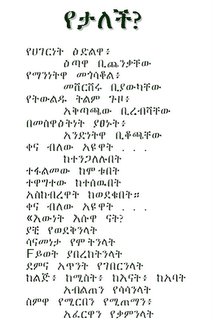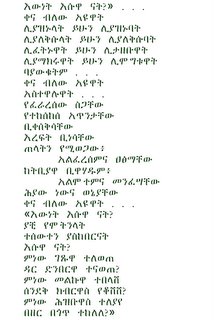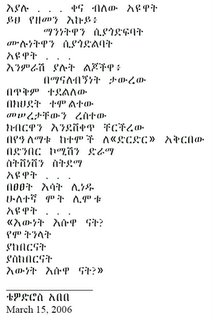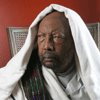Introduction
Following the demise of the other Ethiopian alternative forces by the Dergue and the creation of a ‘power vacuum’, the seizure of power by the TPLF/EPRDF in 1991 after the fall of the Dergue was received with a mixture of relief, skepticism and a general passiveness by the people of Ethiopia.
To some people who did not know the leadership of the TPLF properly, the end of the military regime seemed to be the end of terror and they hoped that peace would prevail and the recurrence of famine would be prevented by economic development. Those who felt relieved took the rhetoric on democracy by the new power holders at its face value and they expected changes for a better future. Those who received the TPLF with skepticism had also lack of information on the TPLF and gave the new regime the benefit of doubt.
For those, who knew the undemocratic nature of the TPLF leadership, it was easy to extrapolate from the past experience of the organization and foresee that the take over of power by the TPLF/EPRDF would be the continuation and extension of the tyrannical rule of Meles Zenawi all over Ethiopia, with dire consequences for the sovereignty of the country and human life. The TPLF had never practiced democracy in the organization, within the people of Tigray in whose name the struggle was waged and with other rival organizations throughout the course of the armed struggle. This was a source of concern that the country may get out of the frying pan, into the fire.
The EPRDF was therefore, neither welcomed nor opposed by mass rallies. The people were already made passive and incapacitated to take any concerted action, because they were intimidated and not allowed to freely organize themselves under the military regime.
As soon as it seized power, the TPLF/EPRDF regime, like an occupation force, began dismantling all national and state institutions such as trade unions, professional associations, and the national defense establishment to pave the way for ethnic politics. The regime pursued a policy of division, terror and control of the people by adapting its ethnic politics to its Stalinist form of organizational structure of centralism and hierarchy, thereby eroding human and democratic rights, the unity of the people as well as the territorial integrity and sovereignty of the country.
The TPLF leaders propagate the erroneous notion that ethnic based parties are the sole means of articulation and representation of interests of the people of any language group. The TPLF promoted this notion from its organizational programme, elevated it to a state policy and imposed it on Ethiopia by intrigues and brutal force. The current conflict between the TPLF and the opposition has its roots in this dangerous policy of the ruling party, which equates unity with domination and suppression.
The imprisonment and consequent accusation of the opposition leaders of inciting violence against the people of Tigray is a misleading act of irresponsibility. The charge of genocide and treason against the active and critical elements of the population is simply so ridiculous that this trumped-up charge will add up to the shameful crimes committed by the prime minister against Ethiopia and the Ethiopian people. This act is a last ditch attempt by the regime to mobilize the people of Tigray against any party which poses any threat to the absolute power of the mass murderer, Meles Zenawi. The people of Tigray have been living with their fellow Ethiopians for thousands of years in peace. For Tigrayans, Ethiopia is not a grant but their achievement; it is their identity. However, Meles Zenawi is driving a wedge between Tigrayans and Amharas, as he is doing between several ethnic groups.
Statement
The Prime Minister has failed Ethiopia in defending the sovereignty of the people and the territorial integrity of their country, internal peace and harmony. He is unwilling to free the people from the humiliating dependency on handouts for survival. The ruling group collaborated with enemies of Ethiopia to undermine Ethiopian unity and access to international waters. The regime conspired with forces, which wanted to benefit at the cost of Ethiopia and Ethiopians.
The current crisis is the creation of the leaders of the TPLF/EPRDF in general and that of the prime minister, who has an absolute power, in particular. The rigging of the elections, the use of ruthless force to suppress the legitimate rights of the people who demand the restoration of their verdict, the brutal crack down on the opposition and the press, the accusation of the opposition and the attempt to silence all concerned and critical elements of the society is upsetting the people, destroying peace, harmony and a sense of security. The regime is practicing a reign of terror. The Ethiopian people rejected Meles Zenawi and his clique in the polls and reiterated their rejection by defying his attempt to forcefully silence them and the opposition by force. More betrayal, suppression, lies and more court dramas orchestrated by Prime Minster Meles Zenawi and co. will not bring stability and peace in the country.
After examining the situation prevailing in Ethiopia in depth, we the undersigned Ethiopians from Tigray, out of devotion to the integrity of our country, peace and prosperity of its people, have issued the following declaration in full solidarity with all fellow Ethiopians.
1.We call for the immediate and unconditional withdrawal of the false and ridiculous charges of genocide and treason against the leaders and members of the opposition, the press people and other activists. We condemn the court drama against the members of legally registered political parties and their leaders, who have been elected in the May 2005 elections and all prisoners of conscience. We call for their immediate and unconditional release.
2.The Prime Minister is responsible for the series of massacres which have been committed in Ethiopia (in Gambella, Awassa, Jimma, Gonder, four times in Addis Ababa etc.), for the incarceration of citizens with concocted accusations, for wreaking havoc amongst the Ethiopian People and misusing the name of the people of Tigray in this connection. Meles Zenawi is also a danger for the territorial integrity and sovereignty of our country as he has been repeatedly showing his anti-Ethiopian position in connection with the conflict with Eritrea. It has to be born in mind that his machinations of creating ethnic contradictions is also part of his scheme to abort a united opposition against his policy of eroding Ethiopian sovereignty
3.We condemn the use of lethal means against demonstrators and the sinister act of sowing ethnic conflicts. We call for the release of all political prisoners, the closure of all the concentration camps and an end to the violent suppression of the democratic and human rights of the people. We oppose the suppression of all-Ethiopia institutions and/or encompassing organizations that had hitherto been promoting nation-wide unifying agendas.
4.We call for the resignation of Meles Zenawi as Prime Minister of the country and as chairman of the EPRDF to create a conducive atmosphere for members of TPLF/EPRDF, who have not committed crimes against humanity to make a fresh start and commence negotiations with all opposition parties based on the results of the May 2005 elections and form a government of national unity with the objective of eradicating the politics of hate and organizing an early democratic election.
5.We call upon the members of the TPLF/EPRDF, who have not committed crimes against humanity, opposition forces, human rights activists, civic and professional organizations to organize a platform of national reconciliation and the unity of the Ethiopian people should be given utmost priority.
6.We call upon all democratic and patriotic Ethiopians to examine the current political crisis in Ethiopia beyond ethnicity and local interests. Ethiopian unity is at stake and we must constantly and vigilantly combat ethnocentric politics that could undermine our unity. Each and every Ethiopian has an historical obligation to secure the unity of the Ethiopian people.
1. Abraha Belai
2. Mamu Gebre Medhin
3. Berhane Girmay
4. Teka Kesete
5. Godofai T. Giorgis
6. Mehari Abera
7. Gebre Medhin Araya
8. Haile Selassie Yohannes
9. Beyene Gebray
10. Berhe Abay
11. Ghirmay Gezehegn
12. Ghidey Zeratsion
13. Aregawi Berhe
14. Dr. Gidey Assefa
15. Tesfay Atsbeha
16. Kahsay Berhe




